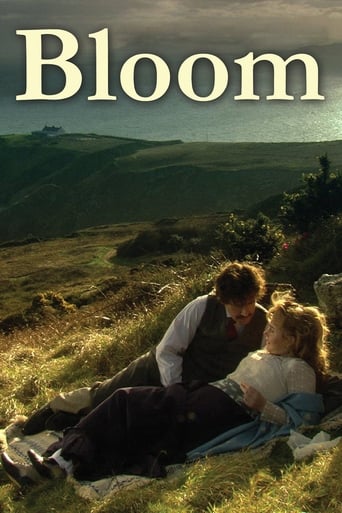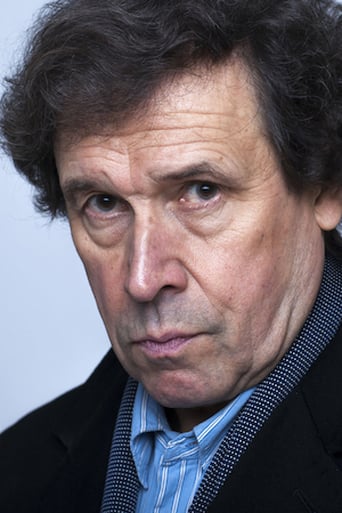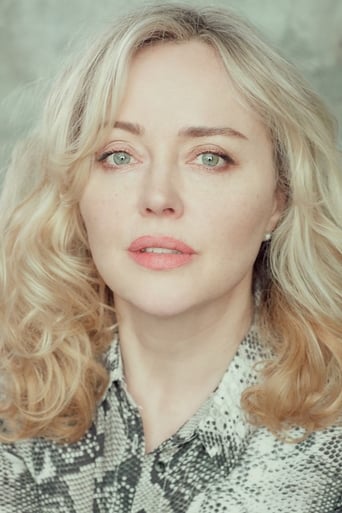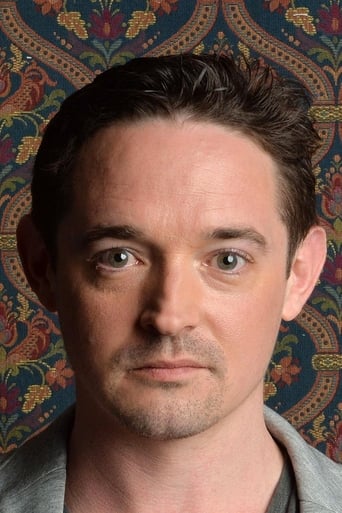

Bloom (2004)
Adapted from James Joyce's Ulysses, Bloom is the enthralling story of June 16th, 1904 and a gateway into the consiousness of its three main characters: Stephen Dedalus, Molly Bloom and the extraordinary Leopold Bloom.
Watch Trailer
Cast
Reviews
Undescribable Perfection
This movie is the proof that the world is becoming a sick and dumb place
Funny, strange, confrontational and subversive, this is one of the most interesting experiences you'll have at the cinema this year.
This is a gorgeous movie made by a gorgeous spirit.
Yes it's true that maybe it has a History Channel feeling, a music that may sound crappy, and so on, but it's just ...genius. How much of this film is a director's choice? We don't know. We can't. Everything is so perfect, the necessary cut-off choices so well-made... How can't you just *love* it? Every single actor of this film is perfect, and Angeline Ball's Molly Bloom is special. Her final monologue is rendered though a true theatrical mastery. Stephen Rea's Bloom too is incredible. Hugh O'Conor shows us what does it means to be twenty-two and to be called Dedalus. His interior monologues are perfect too. All monologues and dialogues are perfect. A special attention has been delivered to the sound of the voice. The sound is very important in this film. All the technical choices show a director that tries to be incredibly ambitious, and humble, at the same time. And for me, it's a huge success.
A total disappointment. I thought the Strick 1967 version was bad; compared to this, that version seems like "Citizen Kane." Where to begin?? The direction is far too facile & literal--much of the film is done in voiceovers, and in some scenes every literal reference finds its way on film. The filming of the "Circe" episode is the most wince-inducing, because we see as "real" what is for the most part dream/hallucination-induced. In addition, the actors are all wrong. Stephen Rea was brilliant in "Crying Game"; however, pushing 60, he's too old for the 38-year-old Leopold Bloom. The guy playing Stephen Dedalus seems like an adolescent and far too giddy for a guy who neither bathes nor has fond memories of his mother's death (never mind his trauma over having a Brit shoot up his domicile). The actress playing Molly __seems__ too young and is too physically fit. (In the book, everyone refers to her as being fat). The only enjoyable parts of the movie had nothing to do with the film production BUT everything to do with Joyce's writing. Read the book! Bob
It's tempting to describe this film by listing all the things it is not. The earlier black and white version, by Joseph Strick in the Summer of Love 1967, starring Milo O'Shea, was too steamy for Ireland and Glasgow, where it was banned, but it was quite sedate and circumspect even by the mores of the time. There has been an excellent serial on BBC Radio, where good use was made of echo/reverb and stereo in depicting the various voices of guilt, regret, lust, fantasy, stream-of-consciousness. In a sense, Michael Winterbottom got closer to the show-off spirit of Joyce in 'Cock and Bull Story', but this production is its own movie. It certainly gets back to the 'cut and paste' feel of the book, and looks every bit as lubricious and smelly as it aught to. Dublin looks dark and damp as it is on the written page, albeit with a touch of filmier romance. The scenes of pure mad fantasy, on the other hand, are either under hardedged sit-com lighting or bathed in a 'Ridley Scott' fog. Most of the dialogue is slightly stagey - or it has the kind of distanced feel associated with post-synching, but only once does this mannerism jarr, when Dedalus (Hugh O'Connor) is spouting his opinions on life and art; so 'rehearsed' and declamatory that it could almost be seen as a deliberate nod to Joyce's category-jumping. Stephen Rea has just the kind of hang-dog look of regret, guilt and ineptitude you can imagine in Leopold Bloom; Angelina Ball as Molly is permanently redolent of warm bed. A neat trick with the structure was to begin with Molly's soliloquy,but otherwise, the overall framework follows the book; if we had been deprived of That Ending, who knows, riots could have broken out. As it is, the acceptance of human folly and the celebration of cerebral grandiosity in vile bodies forms a happy cloud round the exit. One to see again. CLIFF HANLEY
When you go to see a movie it helps if you know a little bit about the subject. For example if you see a James Bond film it helps if you know that he is British and against the Russians – or whatever. It's the same with this film – it helps if you know about James Joyce and helps even more if you know about Ulysses which the movie has been adapted from. The book has many themes and it's a book where the words are very important – not the plot; so the director has made the words important to this movie.One of the most famous passages in Ulysses is Molly Bloom's Penelope soliloquy at the end of the book. It starts on page 659 and ends on page 704 – it is one long stream of consciousness sentence with no punctuation and only gaps for paragraphs; it takes in many images and history of the characters. In this film the director, Sean Walsh, starts with this soliloquy and during it he cuts to various memories of her loving 'Poldy' – Leopold Bloom - in good times and to her sexual exploits with the current beau Blazes Boylan. This works very well and the music, 'Love's Old Sweet Song,' matches underneath the soliloquy perfectly. Ulysses, apart from being written in many styles of other writers of the time, has parts which are dedicated to the human body, parts which are dedicated to colours and parts which are dedicated to music and one of the most memorable pieces of music, which goes with the stunning cinematography by Ciarán Tanham, is the aforementioned 'Love's Old Sweet Song'; this music sets the mood for the whole film.The soliloquy is used throughout the film as a counter commentary to the innermost thoughts of her husband, Bloom. He knows what she is doing back at their house in Eccles Street with Blazes Boylan, who is supposed to be there to arrange a concert tour, so he stays out of the way and goes on his famous wander around Dublin with the text being spoken in voice over as he observes his day, on June 16th 1904, as it has been his day, Bloomsday, ever since.Ulysses is what you might describe as an epic novel. Other adaptations of epic novels, such as East of Eden, concentrate on a certain section of the book. This film doesn't do that. There will be those who might think this film tries to do too much but I don't think so; I think it does enough. It gives you a smattering of what Ulysses is about and if you have never read it this film will give you a good start; a kind of Cliff's Notes on film.I first heard Stephen Rea play Stephen Dedalus on BBC radio and here he is coming full circle and playing Bloom. A little less rotund than one has imagined Bloom to be but perfectly cast nonetheless and very intelligently played - as is Molly Bloom by the voluptuous Angeline Ball – hasn't she come on since her debut in 'The Commitments' and why don't we see more of her? Usually it's very hard to get anything by James Joyce produced as the rights to his works are owned by his grandson Stephen. But I believe this film was started when James Joyce's works were in public domain before the law changed. We are very lucky that a director like Sean Walsh came along when he did and made such a beautiful film. I think he was governed by the budget in a good way as I dread to think what a Hollywood Studio would have done with a massive budget. As I mentioned this took place on June 16th 1904 and on that day the winner of the gold cup was a horse called 'Throwaway' and when Bloom inadvertently tips the winner we can see that the jockey on the horse is a certain Mr Sean Walsh. The reason why this story is set on June 16th 1904 is because that was the day James Joyce first walked out with his beloved Nora Barnacle. As Sean Walsh took a little licence over the end credits with Bloom wandering around modern Dublin might it have been more fitting as this was a film to have a glimpse of James Joyce and Nora walking together on that fateful day?


